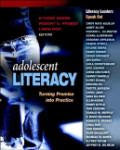For the introductory chapter, I'm just going to write about some of the excerpts from the chapter that I highlighted and why I highlighted them.
The first section in the intro that really caught my attention was on page xiv, second paragraph about 2/3 of the way down. The section starts " We'd like to push many of them side and suggest that much literacy development is not subject specific... [W]e learn the syntactical cues and that show us ... relationships and use those cues across all content areas."
I marked this because it just supports the directions that we have been taking for the past couple of years, especially with the TLTTs getting into the content areas and showing content teachers how to integrate literacy strategies onto the content areas. I hope that more teachers see that they can teach good literacy strategies and not have to give up content. Since I'm out of the school, I find it hard to have a sense if content teachers are being more accepting of their role as teachers of both content and literacy or if they are still clinging to the belief that they don't teach reading (and writing and spelling, etc).
For English, I really feel that especially with grade 9 and 10 students, we need to go beyond the literary criticism/analysis focus and focus on how they interpret the texts. I just read and article in the current issue of English Journal that addresses this issue. The teacher had 2 Grade 11 English classes and he did his regular lessons (where he asked the questions and led students to the 'right' answer) with one and with the other he used the same texts but used a variety of literacy strategies (inferring, making connections, visualizing, summarizing, organizing), oral discussions and rereads of short text passages to help students build meaning. He found that the second class, who was required to construct and support their own meaning from the text understood, comprehended and retained much more that when he used his traditional methods.
The second place where I marked was on the next page (xv), first paragraph where it starts "Will the strategies presented in this book help your students who read significantly below grade level? Absolutely - but only if you use the strategies that are at the student's instructional and/or independent reading levels."
A question came to mind here. Why are so many teachers still teaching the whole class novel? So many times I see requests in the English conference by teachers looking for whole class sets of novels (and some of these novels are really old). How do we engage students with texts that not all of them can read or even want to read? A significant amount of money was invested in small groups of books for lit circles and there are online databases that teachers can access to get magazines and newspaper articles at different reading levels for students. I am wondering why we even have use for an English textbook. One of the things we need to do this year is to choose new English textbooks for grades 9 -11 academic, applied, college and university. Do we need these textbooks or would more small sets of novels and non-fiction at a variety of reading levels be a better use of our money? I really fell that there is a need for more differentiated texts to engage our students.
The last section that I highlighted was on page xvi the second and third paragraphs. This was just a reminder to me that my job as a teacher is to model and provide scaffolded lessons that support students to move to independence. I can think of the times that I didn't provide that scaffolding and was just an activity giver and assumed that the students had all of the skills to complete the assignment. Strangely enough, when I was an activity giver it was when I was teaching secondary school, not elementary. What happened when I walked through those secondary doors? Why did I assume that these adolescents had all the skills?
I look forward to your comments and responses.
Showing posts with label introduction response differentiation literacy_skills. Show all posts
Showing posts with label introduction response differentiation literacy_skills. Show all posts
Tuesday, August 5, 2008
Subscribe to:
Posts (Atom)
